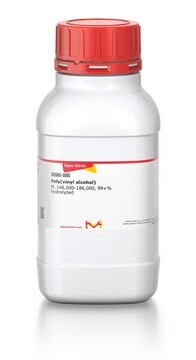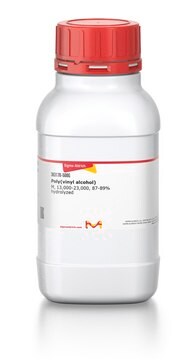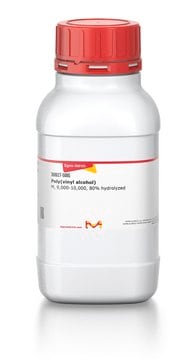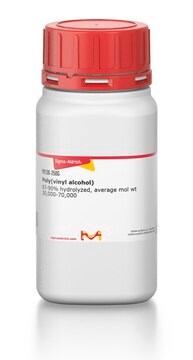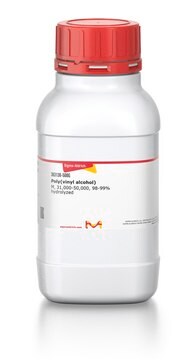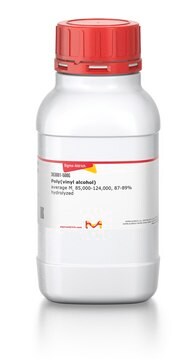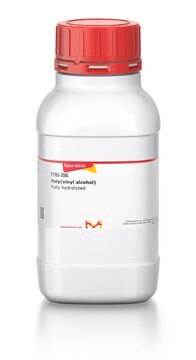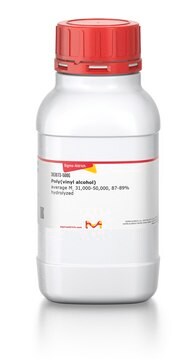363146
Alcool polyvinylique
Mw 85,000-124,000, 99+% hydrolyzed
Synonyme(s) :
PVA
Se connecterpour consulter vos tarifs contractuels et ceux de votre entreprise/organisme
About This Item
Formule linéaire :
[-CH2CHOH-]n
Numéro CAS:
Numéro MDL:
Code UNSPSC :
12352104
Nomenclature NACRES :
NA.23
Produits recommandés
Niveau de qualité
Forme
powder or crystals
Poids mol.
Mw 85,000-124,000
Chute de bille
28-32 cP, 4 % in H2O(20 °C)(lit.)
InChI
1S/C2H4O/c1-2-3/h2-3H,1H2
Clé InChI
IMROMDMJAWUWLK-UHFFFAOYSA-N
Vous recherchez des produits similaires ? Visite Guide de comparaison des produits
Description générale
Poly (vinyl alcohol) (PVA) is a useful industrial, medical and biomimetic material. PVA with high molecular weight is useful in preparing gel which possesses both high strength and modulus. Hence, it is used for the production of fibers, films or gels.
Application
- Poly (vinyl alcohol) recent contributions to engineering and medicine: This article discusses the diverse applications of PVA in engineering and medical fields, emphasizing its versatility and potential in various domains (Feldman, 2020).
- Chemical modification of poly (vinyl alcohol) in water: This study explores the chemical modification processes of PVA, enhancing its functional properties for advanced material applications (Awada & Daneault, 2015).
- Crosslinked poly (vinyl alcohol) hydrogels for wound dressing applications: Reviews the use of PVA in creating hydrogel dressings for medical applications, demonstrating the material′s effectiveness in healing and treatment scenarios (Kamoun et al., 2015).
- A review on mechanical and water absorption properties of polyvinyl alcohol based composites/films: This review focuses on the mechanical and water absorption properties of PVA composites, crucial for developing advanced materials in various scientific and industrial applications (Jain et al., 2017).
- Properties and applications of polyvinyl alcohol, halloysite nanotubes and their nanocomposites: Analyzes the synthesis, properties, and applications of PVA-based nanocomposites, highlighting their significant potential in nanotechnology and material science (Gaaz et al., 2015).
Code de la classe de stockage
11 - Combustible Solids
Classe de danger pour l'eau (WGK)
WGK 1
Point d'éclair (°F)
No data available
Point d'éclair (°C)
No data available
Équipement de protection individuelle
Eyeshields, Gloves, type N95 (US)
Faites votre choix parmi les versions les plus récentes :
Déjà en possession de ce produit ?
Retrouvez la documentation relative aux produits que vous avez récemment achetés dans la Bibliothèque de documents.
Les clients ont également consulté
Active chitosan/PVA films with anthocyanins from Brassica oleraceae (Red Cabbage) as Time-Temperature Indicators for application in intelligent food packaging
Pereira VA Jr, et al.
Food Hydrocolloids, 43, 180-188 (2015)
Design and development of papain-urea loaded PVA nanofibers for wound debridement
Shoba E, et al.
Royal Society of Chemistry Advances, 4(104), 60209-60215 (2014)
B D Price et al.
Physics in medicine and biology, 55(4), 1177-1188 (2010-01-29)
We have developed a novel phantom material: a solution of polyvinyl alcohol (PVAL) in ethanol and water, freeze-thawed to produce a solid yet elastically compressible gel. The x-ray attenuation and mechanical properties of these gels are compared with published measurements
Synthesis and characterization of CdS quantum dots with carboxylic-functionalized poly (vinyl alcohol) for bioconjugation
Mansur HS, et al.
Polymer, 52(4), 1045-1054 (2011)
Hua Yang et al.
Molecular therapy. Nucleic acids, 20, 451-458 (2020-04-11)
We have reported that of the 10 most commonly used adeno-associated virus (AAV) serotype vectors, AAV6 is the most efficient in transducing primary human hematopoietic stem cells (HSCs) in vitro, as well as in vivo. More recently, polyvinyl alcohol (PVA), was reported
Notre équipe de scientifiques dispose d'une expérience dans tous les secteurs de la recherche, notamment en sciences de la vie, science des matériaux, synthèse chimique, chromatographie, analyse et dans de nombreux autres domaines..
Contacter notre Service technique
